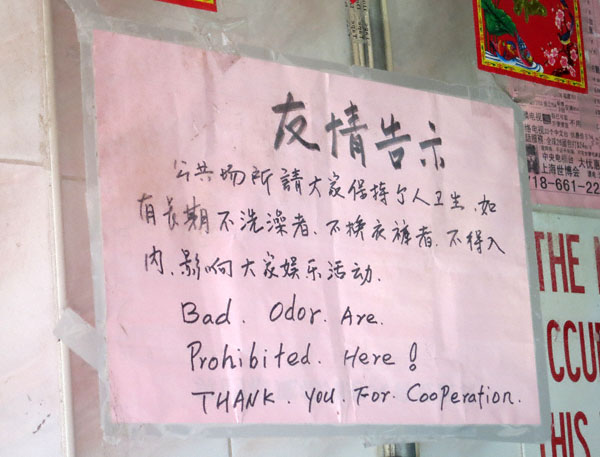Bad odor are prohibited here!
« previous post | next post »
David W. Donnell has brought this signage from Chinatown, NYC to my attention:
"From Forsythe Street." (VHM: that should be "Forsyth Street.")
Here are the sentences in the photo:
友情告示
公共场所請大家保持个人卫生,如
有长期不洗澡者、不换衣裤者,不得入
内,影响大家娱乐活动。
Bad. Odor. Are.
Prohibited. Here!
THANK. You. For. Cooperation.
Pinyin transcription:
Yǒuqíng gàoshì
Gōnggòng chǎngsuǒ qǐng dàjiā bǎochí gèrén wèishēng. Rú yǒu chángqí bù xǐzǎo zhě, bù huàn yī kù zhě, bùdé rù nèi, yǐngxiǎng dàjiā yúlè huódòng.
English translation:
Friendly Notice
This is a public place where everyone should maintain their personal hygiene. Those who haven't taken a bath or changed their clothes for a long time are not permitted to enter to avoid influencing the enjoyable activities of others.
The notice is sufficiently clear that it does not require explanation.
[Thanks to Cao Lin and Cheng Fangyi]

Chris Waigl said,
May 6, 2013 @ 10:47 am
Presuming the same person wrote both versions, which is not necessarily the case but surely possible, this should caution against judging the level of nuance in someone's thinking from the sophistication in that person's approach to writing down their thoughts in a foreign language.
This idea is not as evident as it should be among people with no particular interest in how language works. The other day I got into a controversy in a comment thread. The original post was finger-pointing a statement in English from someone whose first language isn't English. It sounded sexist and uninformed. While I couldn't conclude, of course, that the speaker wasn't indeed a raging misogynist, I could equally see the possibility that he was simply describing a situation (which included a woman getting beaten up by her husband, a relative of the speaker's) with the words at his disposal. To a native speaker it sounded as if he was condoning the other man's actions, but pretty much only for pragmatic reasons.
Jon Lennox said,
May 6, 2013 @ 11:18 am
It's interesting that there's nothing directly equivalent to "Thank you for [your] cooperation" in the Chinese text. Presumably the author picked up this idiom from English-language signs and announcements…
Lazar said,
May 6, 2013 @ 4:05 pm
I've always chafed at signs that thank people for their cooperation, especially if the thanks comprises the entire text (i.e. "Thank you for not smoking"). Thanks implies a moral agency on the part of the thanked, and must logically be extended after this agency is exercised; but these signs extend thanks to everyone – even, erroneously, to the non-cooperators – before they've had a chance to decide to cooperate.
Daniel Tse said,
May 6, 2013 @ 10:58 pm
Strange — all in simplified, except for 请.
Eric P Smith said,
May 7, 2013 @ 6:10 am
@Lazar
What about the signs that thank everyone – including, erroneously, the non-cooperators – after the event? I'm thinking of the sign addressed to drivers as they leave a village, "Thank you for driving carefully", matching the "Please drive carefully" that greeted them as they entered. I find these signs polite and pleasing, notwithstanding any illogicality.